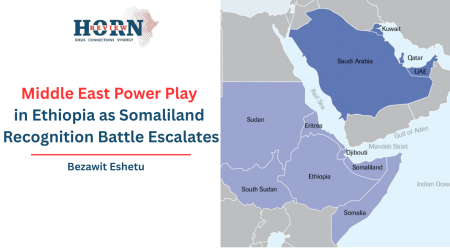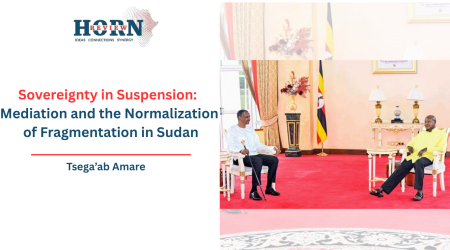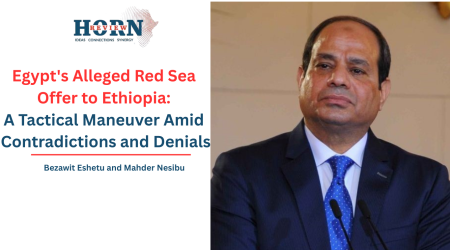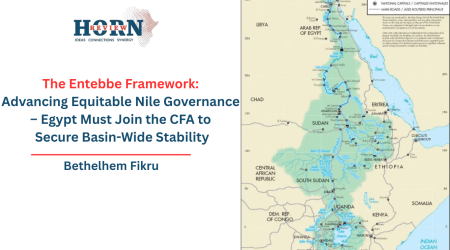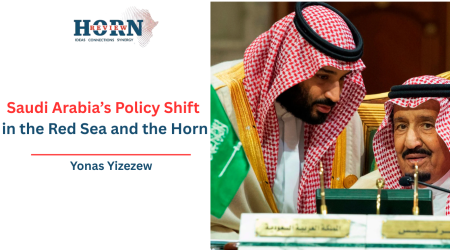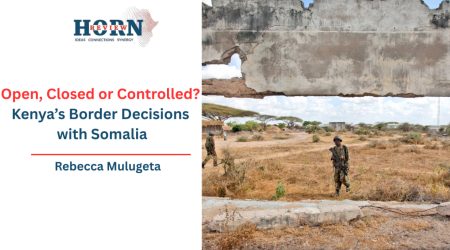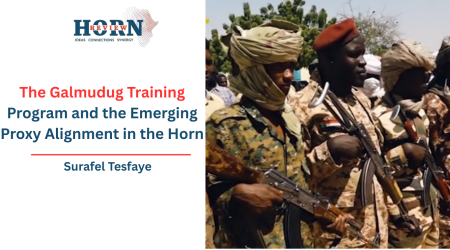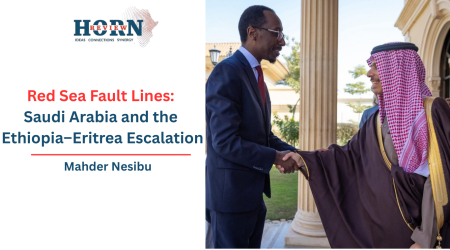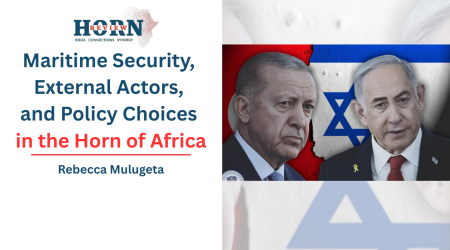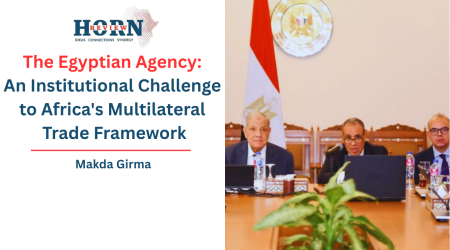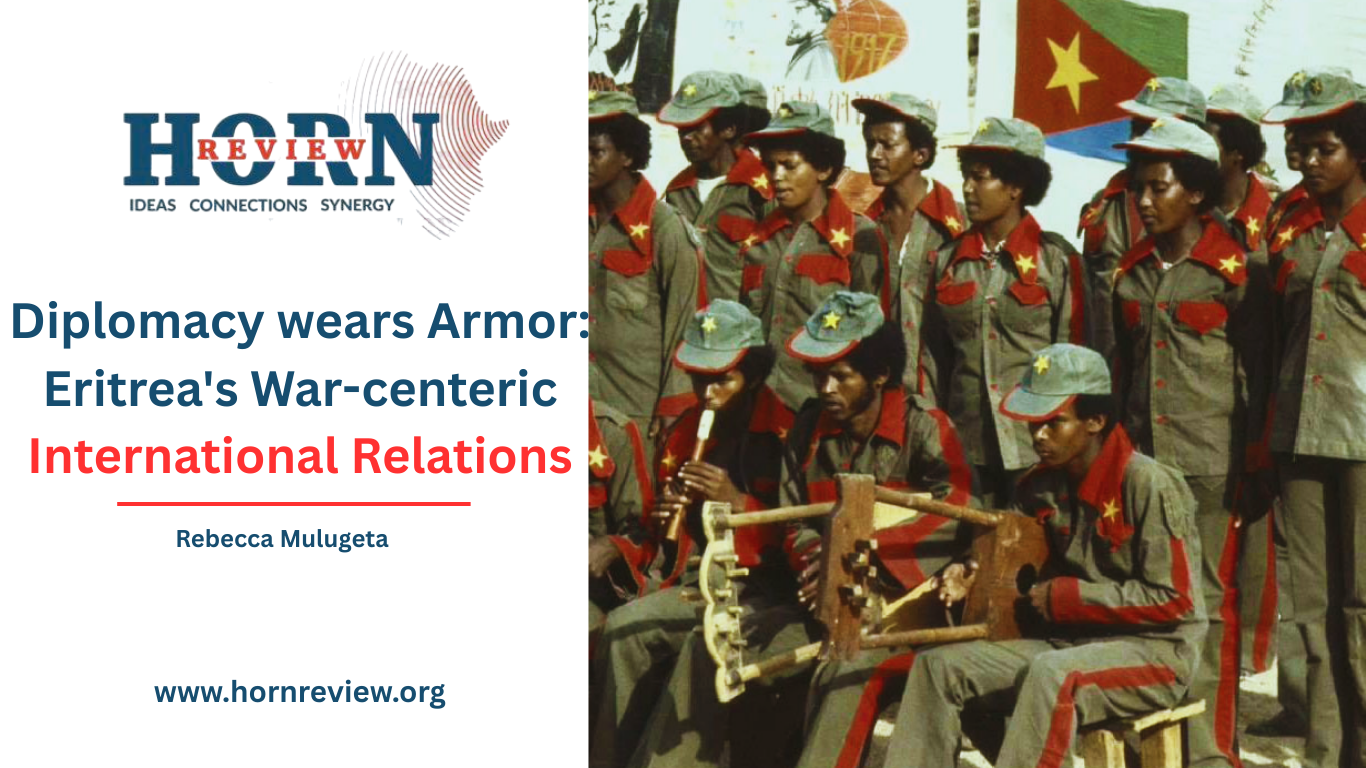
21
Nov
Diplomacy wears Armor: Eritrea’s War-centeric International Relations
Eritrea’s diplomacy wears the armor of war, showing the African proverb, “The war does not end when the enemy is defeated; it is ended when the enemy ceases to be an enemy.” Born from a brutal secession struggle and forged by the iron will of the EPLF, now PFDJ, Eritrea’s statecraft is inseparable from its military legacy that is a fierce, unyielding defense posture that views diplomacy not as a bridge to peace and development, but as a battlefield for survival and containment specially towards Ethiopia. Like a fortress besieged, the regime mobilizes its citizens, diaspora, and regional proxies as soldiers in an endless war strategy, where dialogue is suspicion and cooperation is weakness for the long served regime. This war-centered diplomacy, reminiscent of other authoritarian states cloaked in the myth of perpetual conflict, binds Eritrea to a cycle of confrontation, isolation, and resistance that path to progress and peace. To understand Eritrea’s place in regional geopolitics is to recognize that here, the type of diplomacy dresses in the colors of conflict, where every gesture is a calculated step in a grand strategy of war by other means.
The entire past of prolonged armed struggle and militarized nationalism informs Eritrea’s current diplomatic and political posture. The EPLF was a military organization whose path rested on unrelenting commitment to armed resistance in leading the fight for session against Ethiopia. The session lasting almost three decades from the 1960s until 1991 was characterized by a total war mentality that deeply influenced the emergent state’s diplomatic culture.
The EPLF’s legacy positioned military readiness, and confrontation as core to Eritrea’s identity and sovereignty. This ideology did not dissolve with secession only in 1993 but instead became encoded in state policy and diplomatic strategy.
The strategic position of post-independence Eritrean foreign policy is seen in its historical and adversarial dynamic with Ethiopia. This war-centric diplomacy continues to heavily dictate the country’s regional engagement and resource allocation. The 2018 peace framework, while achieving necessary de-escalation, has demonstrably failed to dissolve Eritrea’s strategic rigidity. Asmara’s operational baseline remains dedicated to deep containment of Ethiopia, a posture evident in its recent diplomatic engagement. Crucially, the pattern of Eritrea’s external alignments from the tripartite agreements to its proactive naval cooperation strategy with Egypt suggests a systematic effort to secure geopolitical and military leverage. This approach places the premium not on regional integration or shared economic gains, but squarely on continuous rearmament and counterbalancing Ethiopian influence.
Eritrea’s policy is also founded on a doctrine that equates national survival with military dominance and regional confrontation. The regime’s proxy conflicts, most especially its putative support for insurgent groups in Somalia, are illustrative that Eritrea has used its proxies and supported armed factions to balance Ethiopian influence in neighboring countries, thus exporting its conflict to undermine its rival. This regional militarized diplomacy disrupts opportunities for bilateral and multilateral cooperation, entrenching instability in the Horn of Africa.
The militarized border conflict in Djibouti in 2008 also saw Eritrea seize disputed territory and reject diplomatic mediation in favor of forceful assertion. The same militaristic approach manifests itself in both the citizen and diaspora arenas, with former EPLF fighters and conscripts continuing to actively support the regime’s military ambitions through financial and logistical aids, including arms procurement.
Crucially, this militarism pervades not only official state diplomacy but also Eritrean citizen diplomacy, notably through the diaspora, which plays a vital role in sustaining the regime’s war posture. Eritrea’s indefinite national service program forcibly militarizes society by embedding military discipline and obligations into the lives of its citizens for indefinite periods. This policy extends to expatriate communities, who often serve as conduits for political and financial support for the regime’s military agenda, not all but some with the support of the authoritarian regime. The diaspora, composed for the most part of former combatants or national service conscripts, mobilizes resources, channels funds, and in some cases facilitates arms procurement, reinforcing a war-rented state identity that conceives diplomacy as an extension of armed struggle.
This pervasive militarization and the prioritizing of conflict containment by the regime have brought severe consequences in terms of the international standing and development prospects for Eritrea. Eritrea remains an isolated country in diplomatic circles, with very limited formal engagement with international and regional organizations especially in the area of developments and investment. This war-centered diplomacy, coupled with authoritarian governance, has discouraged foreign investment and stifled effective economic development. International organizations and agencies of the United Nations present minimal operational presence within the country, where Eritrea maintains only one UN delegate. Eritrea has incurred significant losses, including extreme economic decline as a result of the diversion of meager resources to military expenditure and further destruction of trade and infrastructure, overall human suffering characterized by large-scale displacement and loss of life, brain drain as many citizens flee due to conflict and repression, diplomatic isolation with reduced regional cooperation and international sanctions, and regional instability as ongoing conflicts undermine peace and development in the region. These costs have constrained Eritrea’s long-term development prospects and a cycle of hardship and authoritarian control.
The regime’s diplomatic isolation also reflects its rejection of mediation efforts or multilateral peacebuilding initiatives, often viewing such efforts as threats to sovereignty or signs of weakness. Eritrea has adopted a resistant approach to negotiations, as seen during and following the war in Ethiopia. Rather than advancing dialogue, Eritrea has frequently reinforced militarized tactics and hardline rhetoric, leading to cycles of mistrust and hostility, seeking rival allies like Egypt to contain Ethiopia’s interest.
Comparatively, Ethiopia’s diplomatic evolution post-2018 is in striking contrast. Ethiopia increasingly sought regional cooperation and stability by trying to mediate disputes, building strategic alliances especially with African states and international actors concerned by Nile Basin issues and broader Horn of Africa dynamics. Be a hub for the international conventions, The citizens are focused on pursuing the interests of the country rather than focusing on war. This strategy intentionally leverages citizen involvement politically, financially, and morally to galvanize the national psyche, successfully redirecting collective focus away from past military preparedness and toward achieving these long-term strategic goals in terms of GERD and the Red Sea.
Crucially, both the GERD and the Red Sea quest are strategically positioned as drivers of regional cooperation.where major national endeavors serve as the foundation for broader stability and diplomatic influence. Clearly, this stands in high contrast to Eritrea’s war-oriented diplomacy, underlining how deeply rooted militarism obstructs Eritrea’s ability to head towards peaceful regional integration, even during this period that some sanctions against Eritrea were taken up because of the realization of peace with Ethiopia, which did not sustain.
Even in the quest of the red sea, Ethiopia has consistently pursued dialogue diplomacy by engaging the government and citizens in efforts for peaceful resolution and regional cooperation. That reflects a commitment to good faith negotiations, respect for sovereignty, and the maintenance of established borders. Ethiopia’s leadership, including Prime Minister Dr. Abiy Ahmed and Foreign Minister Gedion Timothewos, has reiteratively shown that Ethiopia seeks access to the sea and regional prosperity through peaceful talks and economic integration, not military force. In the same breath, however, Ethiopia has threatened that provocations cannot continue to be tolerated, thus showing how measured but firm its posture is.
In sharp contrast, Eritrea has remained stuck in a war-centered diplomacy that emphasizes confrontation, military preparedness, and proxy involvements. The country, despite Ethiopia’s invitation to dialogue and cooperation, continues with its destabilizing actions, including alleged support for armed groups that undermine regional stability. This indeed marks the difference, placing Ethiopia on high diplomatic ground to express determination toward the constructive resolution of differences while calling on the international community to urge Eritrea to stop such provocations and engage in peaceful dialogue. While Ethiopia works to actively promote diplomacy both through state channels and those involving its citizens, Eritrea’s continuing militarized posture prevents progress and threatens to perpetuate conflict unless it decides to respond to overtures extended by Ethiopia.
The deeply ingrained, war-rented diplomacy by Eritrea into its state and citizen frameworks is a strategic choice for conflict readiness and containment over development and peaceful engagement. The result has been persistent instability, economic stagnation, and diplomatic marginalization. As long as the regime subscribes to the belief encapsulated by the proverb-that the war does not end until the enemy ceases to be an enemy-it will continue to be trapped in a self-reinforcing cycle of confrontation that forecloses lasting peace and national progress.
Eritrea’s war-centered diplomacy can also be integrated also with the theory of Diversionary Foreign Policy in Authoritarian States to deeply explain its strategic use of external conflict as a tool for internal regime consolidation. In this framework, Eritrea’s prolonged hostile engagement with Ethiopia and regional conflicts serves more than territorial or sovereignty concerns; it is a deliberate strategy meant to divert domestic dissatisfaction away from governance failures, economic hardships, and political repression. By maintaining a narrative of external threat and “no war, no peace” status, the regime under President Isaias Afwerki nurtures a siege mentality among the population, which legitimizes rigid authoritarian controls and mobilizes society around the leadership for survival.
The wars and conflicts help the Eritrean government project strength and control amidst limited internal legitimacy, resorting to nationalist rhetoric and enemies to suppress dissent and justify the continuation of an oppressive political system. The mentality of the conflicts overshadows such internal crises as human rights abuses, economic stagnation, and lack of political freedoms, becoming a unifying and rallying cause for regime survival. This distraction mechanism helps deflect international criticism and domestic unrest as a means of framing opposition to national security. Thus, the war-centered diplomacy of Eritrea strongly corresponds with the theory of diversionary foreign policy that its militarized foreign engagements serve as tactical mechanisms to reinforce regime authority internally, entailing an authoritarian regime under the disguise of defending sovereignty, which simultaneously diverts internal issues.
Eritrea’s diplomacy, forged in an armed struggle and influenced by an authoritarian regime committed to militarization, continues to embody conflict more than cooperation, not even pursuing development focused engagement. The militarization of both statecraft and citizen mobilization undergirds a foreign policy viewing diplomacy exclusively through the prism of war. The militarized posture has isolated Eritrea and stymied economic development, limited humanitarian engagement, and secured its role as a destabilizing actor in the Horn of Africa. Unless Eritrea’s leadership readjusts to be truly opened up to diplomatic engagement and regional cooperation, isolation and conflict will continue on a self-perpetuating cycle, denying the country that peace and progress owed to its history and people. This rejection of peaceful diplomacy for perpetual confrontation unequivocally hampers both Eritrea’s national interests and the broader stability of the Horn of Africa.
By Rebecca Mulugeta, Researcher, Horn Review

